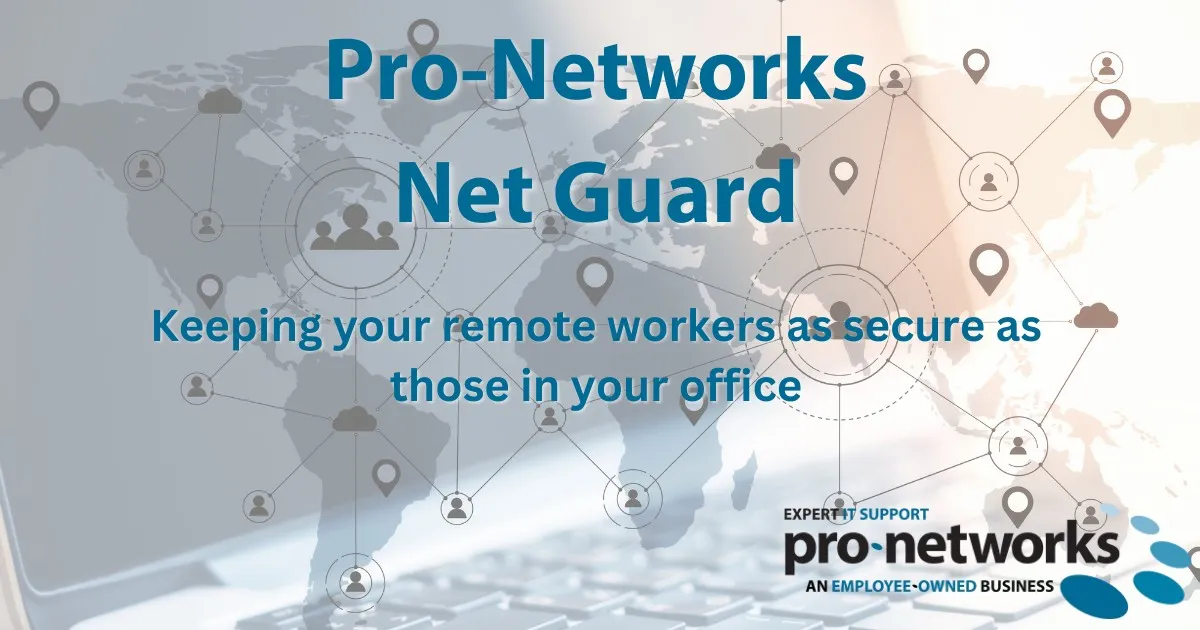
In today's rapidly evolving digital landscape, remote work has become the new norm. With the rise of remote work, ensuring the security of your organisation's network and data has never been more critical. One effective and often overlooked security tool for remote working is DNS filtering. In this blog, we'll explore what DNS filtering is and discuss how Pro-Networks Net Guard gives numerous benefits for remote work environments.
What is DNS Filtering?
DNS stands for Domain Name System, and it serves as the internet's phone book. Every time you type a website's URL into your browser, your device contacts a DNS server to resolve the domain name into an IP address, allowing your device to connect to the desired website. DNS filtering is the process of using DNS servers to block or allow access to specific websites or content based on predetermined rules and policies.
What is Pro-Networks Net Guard
Pro-Networks Net Guard is a device-level DNS filtering solution that is installed on required devices and scans every webpage, as it is visited in real time, and blocks access to sites containing malware, viruses or phishing scams.
A real-life scenario could see an employee fall for a scam email and enter their credentials (for example, M365 or online banking) on a fake site – giving unauthorised access to confidential information to scammers. Net Guard would prevent the fake site from displaying - meaning your employee couldn’t fall victim of the scam.
Net Guard uses a powerful blend of cybercrime intelligence, advanced machine learning, and AI-based prevention to ensure your organisation is protected from current and future threats.
Now, let's delve into the benefits of Net Guard and DNS filtering for remote working.
1. Enhanced Security
One of the primary benefits of DNS filtering is improved security. By blocking access to malicious websites, malware domains, and phishing sites, DNS filtering helps protect remote workers from various online threats. With employees working from diverse locations, securing the network perimeter becomes challenging. DNS filtering acts as an additional layer of defence against cyberattacks, reducing the risk of data breaches and malware infections.
2. Content Filtering, Compliance and Increased Productivity
DNS filtering isn't just about security; it can also help organisations enforce content filtering policies. This is especially valuable for remote work scenarios where employees might be tempted to visit non-work-related or inappropriate websites during working hours. DNS filtering allows organisations to block access to specific categories of websites, ensuring that employees stay focused on their tasks, increasing productivity and compliance with company policies.
3. Monitoring and Reporting
Net Guard comes with robust monitoring and reporting features. Organisations can gain insights into web usage patterns, track access to specific websites, and access reports to assess network activity. This visibility helps organisations identify potential security risks and make informed decisions to strengthen their remote work infrastructure.
4. Scalability
As remote work continues to grow, scalability becomes paramount. Cloud-based DNS filtering solutions can easily scale to accommodate the changing needs of remote workforces. Whether your organisation expands or contracts, Net Guard can adapt to the evolving demands of remote work.
5. Easy Implementation
Implementing Net Guard is as easy as asking us to do it, and it doesn't require significant hardware investments or complex configurations. This makes it an accessible and cost-effective security solution for organisations of all sizes.
In Conclusion
Net Guard is a valuable tool for enhancing security, productivity, and compliance in remote work environments. It protects your remote workforce in a similar way that your office environment is protected behind a properly configured firewall.
Speak to your Pro-Networks Account Manager today to find out more about Net Guard.
